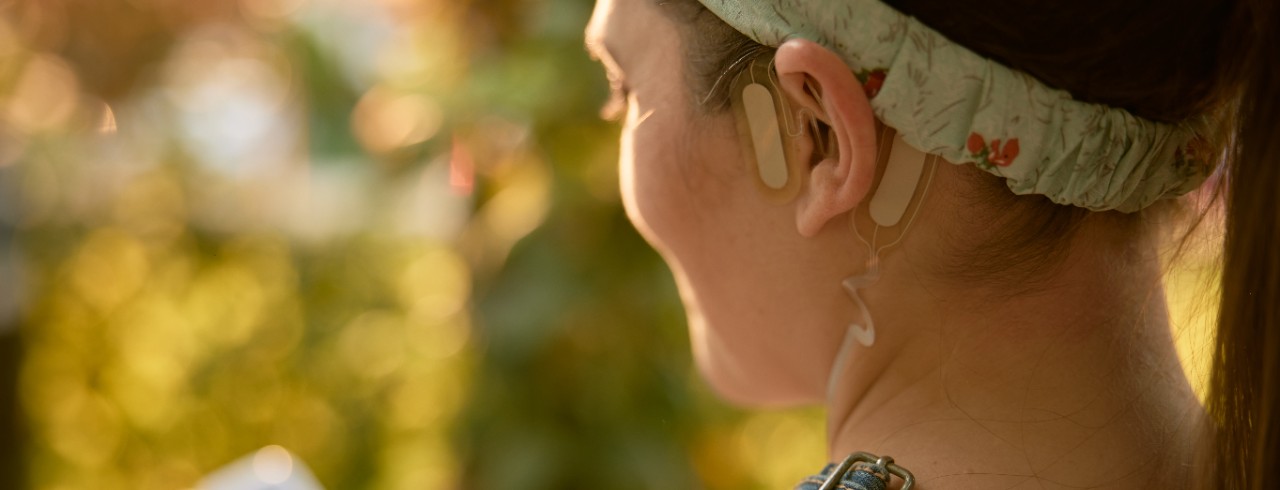
Cape Girardeau, Missouri news highlights UC clinical trial
Study to test neurostimulation to treat opioid withdrawal, PTSD
KFVS-TV in Cape Girardeau, Missouri highlighted a University of Cincinnati clinical trial testing a wearable neurostimulation device to help patients with opioid use disorder (OUD) and post-traumatic stress disorder (PTSD) stick with medication treatment while finding the right dose.
UC's Joel Sprunger, principal investigator of the trial, said the medication buprenorphine is an effective treatment to help patients with OUD manage symptoms of opioid use disorder withdrawal, but there is an adjustment period of up to three months as each patient finds the right dose to manage their symptoms.
In response to this challenge, the trial will utilize the Sparrow Ascent – a patient-administered wearable device that delivers mild electrical stimulation to the cranial branches of the vagus and trigeminal nerves on and around the ear.
Sprunger said the stimulation “pumps the brakes” on the sympathetic nervous system by enhancing parasympathetic activity, helping to transition someone from fight-or-flight to “rest and digest.”
“By providing people control over that stimulation, we can empower them with a way to turn it on when needed and feel some relief,” said Sprunger, assistant professor of psychiatry and behavioral neuroscience in UC’s College of Medicine. “Their heart rate slows down, breathing slows down and there’s a lot less of a sense of panic and urgency. So that’s the key ingredient that we think will hit both PTSD and opioid withdrawal symptoms at the same time.”
The trial is enrolling patients at the Gibson Center for Behavioral Change in Cape Girardeau.
“It does give the patient some ownership and some control over their treatment,” Ryan Essex, Gibson Center chief operating officer, told KFVS. "We get to bring cutting edge treatment options to populations who are kind of our most vulnerable and don’t get access to those."
NeuroNews also highlighted the trial. Read the NeuroNews story.
Featured photo at top of woman wearing the Sparrow Ascent device. Photo/Spark Biomedical.
Related Stories
Mural by UC grad honors U.S. military history
July 17, 2024
Local 12 highlighted a new mural by University of Cincinnati graduate and artist Brandon Hawkins that pays tribute to U.S. military history.
Social media fuels extreme political rhetoric
July 17, 2024
UC College of Arts and Sciences Professor Jeffrey Blevins tells Local 12 that online algorithms fuel political polarization on social media.
Camp aims to empower children, teens who stutter
July 17, 2024
A one-week, evidence-based program for children and teens who stutter at the University of Cincinnati will teach kids to communicate effectively, advocate for themselves and develop confidence about their communication abilities. Camp Dream. Speak. Live., which is coming to Cincinnati for the first time July 22-26, began in 2014 at the University of Texas at Austin. The Arthur M. Blank Center for Stuttering Education and Research at UT expects to serve more than 2,000 children at camps across the United States, Africa, Asia and Europe this year.
UC archivist explores Troy’s invisible workers
July 17, 2024
UC Classics archivist Jeff Kramer examined the unheralded and largely uncredited role laborers played in the 1930s excavation at Troy in Turkey.
From intern to full-time: Recent Lighting Design grad joins Bandit Lites
July 16, 2024
Lighting & Sound America spotlights recent graduate Riley Rowan's new position at Bandit Lites, a full-service design, management and producer of live events and entertainment.
CCM alum Donald Lawrence to be inducted into Cincinnati Black Music Walk of Fame
July 16, 2024
UC College-Conservatory of Music alumnus Donald Lawrence is part of the 2024 class of Cincinnati Black Music Walk of Fame inductees. Located at the Banks in downtown Cincinnati, the induction ceremony on July 27 will feature a parade of stars and a free concert by the Zapp Band.
U.S. stroke survival is improving, but race still plays role
July 16, 2024
U.S. News & World Report, HealthDay and Real Health covered new research from the University of Cincinnati that found overall rates of long-term survival following stroke are improving, but Black individuals experience worse long-term outcomes compared to white individuals.
Collaborative pianist and vocal coach Kirill Kuzmin joins CCM’s faculty
July 16, 2024
UC College-Conservatory of Music Interim Dean Jonathan Kregor has announced the addition of Kirill Kuzmin to the college’s faculty of distinguished performing and media arts experts, researchers and educators. A Grammy-nominated collaborative pianist and vocal coach, Kuzmin begins his new role as Associate Professor of Opera/Vocal Coaching on Aug. 15, 2024.
My incredible first year at Cincinnati Law: Journey, reflections and highlights
July 16, 2024
Dean Haider Ala Hamoudi gives a progress report on his first year as dean of the College of Law.
Presidential challenge to UC: Join Ride Cincinnati to fight cancer
July 16, 2024
UC President Neville Pinto has again challenged every UC college and unit to send at least one rider to the September 14 Ride Cincinnati event to help fundraise for cancer research and cancer care. UC students ride free. Signup by July 31 for free UC-branded cycling jersey.
